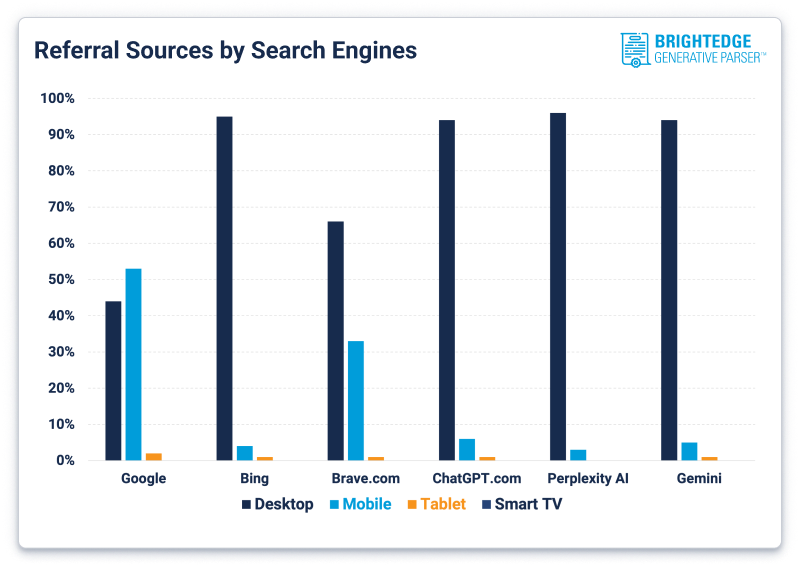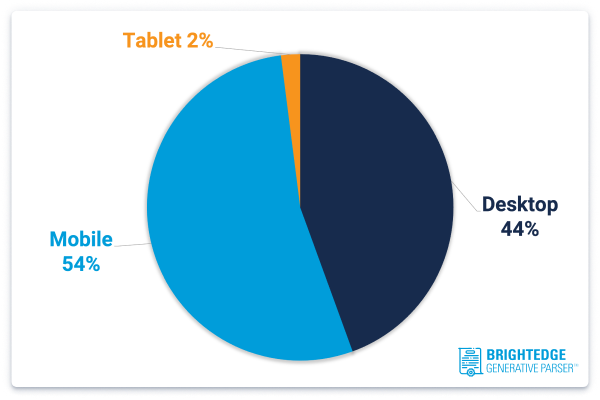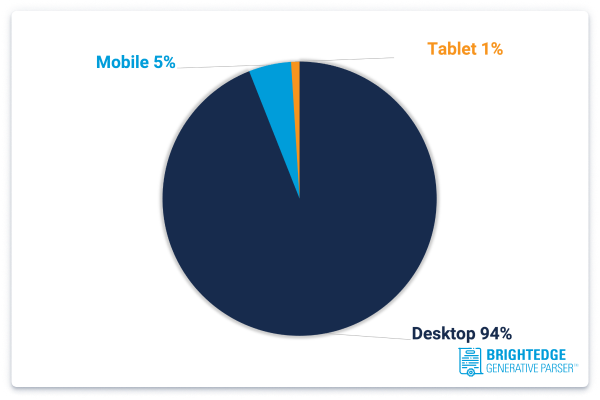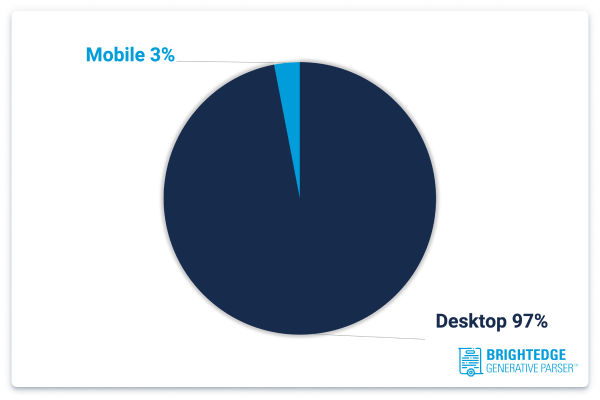The Open Frontier of Mobile AI Search
Executive Summary
Despite the meteoric rise of AI-powered search engines, one surprising insight remains: mobile web search is still largely untouched by the AI revolution.
BrightEdge analyzed referral traffic across leading traditional and generative AI search engines in North America and Europe and found a striking pattern — over 90% of all AI referral traffic originates from desktop devices, with mobile lagging far behind. This stands in contrast to broader user behavior, where mobile dominates total web traffic.
In the lead-up to Apple’s WWDC event, this data suggests a critical, underdeveloped opportunity. With Apple controlling a major share of mobile browser defaults and Google still dominating mobile web search, even a single shift in default search behavior could disrupt the current landscape overnight.
AI Referrals: Still a Desktop-First Experience
While mobile accounts for over half of global web traffic, it is desktop where the AI search engines are currently making the most impact when it comes to referring traffic to websites.

The contrast between platforms is sharp:
- Google Search: The outlier — 44% desktop, 53% mobile
- Bing: 95% desktop, 4% mobile
- ChatGPT.com: 94% desktop, just 6% mobile
- Perplexity.ai: 96.5% desktop, 3.4% mobile
- Google Gemini: 91% desktop, 5% mobile
As Google’s AI features (e.g., AI Overviews) being live on mobile for many users, it currently serves as the only AI-capable search engine with a strong foothold in mobile web referrals — and even then, it barely edges out desktop.
Platform-by-Platform

As the entrenched default on most browsers — particularly Safari on iPhones — Google is the only engine where mobile exceeds desktop. According to North American and European BrightEdge data:
- Mobile share: 53%
- Desktop share: 44%
- Tablet: 2%
This mobile strength underscores the importance of Google's partnerships, particularly with Apple. Yet, its AI integrations on mobile (like AI Overviews) still do not dominate mobile web referrals the way desktop does.

ChatGPT, despite its widespread mobile app usage, sends nearly all its referral traffic via desktop:
- Desktop share: 94%
- Mobile share: 6%
- Tablet: 1%
This pattern likely reflects a key difference in user flow: on desktop, the first click on a ChatGPT citation takes users directly to the source website. But on mobile, the app often intercepts that first click, previewing the content in-app — and only the second click leads to the external site. As a result, ChatGPT drives far more referral traffic from desktop than mobile, even if mobile usage is high.

Even more desktop-centric than ChatGPT, Perplexity sees:
- 96.5% of referrals from desktop
- Mobile barely breaks 3%

As the default for some Microsoft platforms and now integrated into Copilot, Bing is another major player in the AI space — but on mobile?
- 94.4% desktop
- 4.5% mobile
The Apple Factor
While Google may currently hold the advantage in mobile AI web referrals, Apple’s role as the gatekeeper of the mobile browser experience is pivotal.
BrightEdge data shows:
- 58% of Google’s mobile search traffic to US and European brand websites originates from iPhones
- Safari remains the default browser for nearly a billion users
- Apple has not yet embedded AI-powered search into its mobile web stack
But with the upcoming Apple Intelligence announcements and the potential for deeper AI integration in iOS, even a single change in Safari's default search provider could reshape mobile web search overnight.
Conclusion: Apple Holds the Key to Redistributing AI Search
BrightEdge data from North America and Europe shows that while AI-powered search engines are reshaping referral behavior on desktop, mobile web referrals remain overwhelmingly dominated by Google. Engines like ChatGPT and Perplexity send over 90% of their referral traffic from desktop, with mobile barely registering.
That doesn’t mean AI search isn’t booming on mobile — it likely is. But much of that activity happens inside apps, where outbound referrals are limited or delayed.
This isn’t a gap in capability. It’s part of the ecosystem design.
With Safari as the default mobile browser, Apple is the gatekeeper of mobile web search. And with iPhones driving over half of Google’s mobile traffic to brand websites in these regions, even one change — like swapping the default search engine — could trigger a major redistribution of AI-powered traffic.